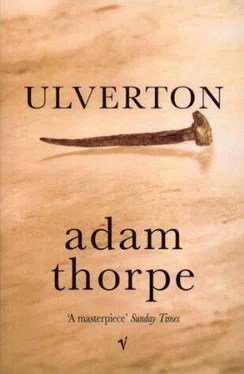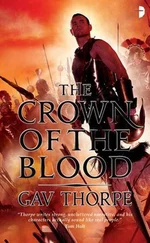But loud, dirty Chittagong was far from my thoughts. I was in the midst of a rolling ocean of chalk, the rain had unstoppered all the secreted perfumes of summer, my legs were sodden at the backs of the knees, and I was happy in my task. For task it was. I was as far from any desk and the vile clatter of an office, as from caring whether we flung up gold or rabbits. The point was to work with limbs and an empty mind. Or a mind full only of the great immediacies: the sun and the wind and the earth.
To breathe, to breathe deep of the biscuit scent of rain-swept barley, shuddering reluctantly at every gust! Or of the sweet richness of the vast hay-stack, thatched golden against the shadowy trees! What other sensations more likely to bring a fever of longing to the far-flung servant in some foul and sweaty imperial post, than these reminders of home, and of gentler seasons? For England is so very gentle, compared to the rest of her Empire. That is, the England of forest and stream, of meadow and vale and rolling downland. There her soft breath wafts over us, along with the tinkles of sheep and the high thudding bells of the ancient churches, marking a slower time than that of the outer world of power and striving: a slow pulse which seemed to me then, standing on that high place, eternally beating.
Alas, that we were not more vigilant!
All that week we chopped and sliced, flinging up nothing more enticing than sleek flints of purely natural ancestry. Butterflies, as if dazed by the sudden removal of a favourite haunt, dallied above our heads and Ernest, the schoolteacher, his little moustache wet with exertion, managed to net an Admiral that blazed in his chloroform bottle like a blown coal. The breezes were cool, and the bread and cheese were as fine as the finest dish up there on that scarp, flavoured by hunger and fresh air. I cannot pretend to have contributed much — my arthritis saw to that — but I did my utmost. I think it was that week, or perhaps the week after, that Austria-Hungary declared war on Serbia. Anyway, it did not matter. We had penetrated five feet, the barrow appeared to have sagged in the middle, we had scoured every inch of spill: I was exhausted, but happy. A liveliness had entered my life; the clouds had begun to disperse; I walked, I might say, with the hint of a spring in my step.
In case the reader feels this to be an unwarranted banishment of melancholy, coming as it did on the eve of wider catastrophe, then let me say that I have noticed eves of great things to be often so lineated. We all expected war. The whole village was buzzing with the expectation of it. But it was still not upon us, and none of us had any idea what form it would take. The world demands things of us, it exacts from us its daily toll of fret and grief, but when it takes it upon itself to swagger, to swell into a grander key, to thrust our petty wants aside and make us chorus War, then we sit and wait: we are suspended for a minute; we are unburdened and happy.
And let me say as well that this was the first time since I was a boy that the crack of a book’s spine had not interrupted the day’s pleasures. Up there on that high mound, I saw nothing but fields and copses stretching away to infinity under the graze of sheep and sun; heard nothing but the murmur of voices, the odd grunt, the wood pigeons purring in the nearby copse, the satisfying splice of the spades keeping their own natural rhythm; felt nothing but the smooth wood handle of my trowel vibrating to the ceaselessly changing resistances of the chalk beneath me. Now I understood that calm certitude the farm-labourer must feel when the job in hand is immediate and clear and devoid of words, that intimate contact with the ancient practices of our race, derided by the city dweller with his insatiable hunger for the new. Never mind that we were seeking treasure, seeking to embody the old village legend of lost riches, searched for still, so it was said, by the ghost of a long-dead shepherd swinging his lantern: for myself, it was a task related to the immemorial tasks of the fields about us, some filled with harvesters and loaded wains, others flecked only with sheep and their lonely flesh-and-blood masters.
No doubt we were microscopic in the great order of things: the soil changed colour on the day the Germans violated Belgian neutrality. It was a sign, apparently, that something, perhaps wooden, had rotted there. The Squire stood and wiped his pince-nez on a bright red ’kerchief, and cautioned us to proceed carefully. He replaced the spectacles on his nose with a great sigh of satisfaction, looking up at the cloudless August sky as if something had been answered from that quarter.
Then a moment of absolute peace ensued, a pause in which everyone present settled into stillness, our trowels and spades motionless, our heads bowed. Over the scarps and vales came the tinkle of sheep-bells, the far shouts of thistle-pulling labourers, the delirious trill of a high lark. The Cabbage Whites and Common Blues fluttered about our heads so close we could almost hear their papery wings. Even Dart, slow, blunt Dart, wiping his nose, appeared aware of the moment’s portentousness. Only the odd creak of a leather boot and young Tom Sedgwick’s wheezes served to remind us of our corporeal reality.
That evening the Vicar came round (the Rectory dwarfs my cottage) and over a glass of sherry stressed the teleological nature of ‘this Slav business’, looking upon it as some kind of cod-liver oil for the moral order. He bestowed himself in my old rocking-chair, squeaking it frightfully as he consumed at least a quarter of my sherry, and all but flung himself to the floor at the peak of his oration. It was only on the following morning, joining the others on the barrow, that I heard the inevitable — we started earlier than the newspaper boy, and in those days before the wireless Ulverton was still a refuge from the world of affairs. It was said jovially that a certain old shepherd by the name of Flower, living in a far-flung hut to the north of the village, and only coming in once a week for his provisions, was the last man in England to know we were at war. I felt envious of the fellow.
That morning, then, there was a curious mixture of the subdued and the excited amongst us. It seemed only fitting that this was the day of the first find. ‘Marlers’ Trevick suddenly yelped just before dusk in a manner that set the rooks off cawing in the nearby clump of elms. The Squire scrambled down (we had by now a fairly impressive depression) and bent over the spot at which Marlers was jabbing a thick forefinger. A small edge of something glinted in the sun.
Within minutes the Squire had lifted up a small bronze pot in which, as we swiftly discovered, huddled the burnt remains of an ancient Briton. We whooped with delight, and my blisters were forgotten. Ernest made elaborate notes while the rest of us uncorked our water-bottles and drank a rather tepid toast. Allun was despatched to fetch champagne, and when he returned the Squire opened the two bottles without pause, an action which sent frothy jets of Heidsieck’s Special Reserve over our sweaty countenances, and only just missed soaking our Bronze-Age friend. As I supped from the bottle, I felt the headiness of victory, and grew momentarily confused as to which great event we were celebrating: the uncovering of the ancient, or the call to arms.
Percy Cullurne was the Manor’s under-gardener at the time — between bouts of ploughing and so forth. He had downright refused to take part in the excavation; a mutinous decision which had exercised the Squire’s fury. But the man wasn’t to be budged, and was too loyal and hard-working a fellow to be dismissed for wishing to tend the estate rather than indulge his master’s latest whim.
One afternoon at the end of June, a month before the whim took body, I discovered the reason for this forthright stance. I was walking around the back of the estate, down the path known as the Pightle Way, switching at the defiant yellow splashes of ragwort with my walking stick, and thinking of nothing in particular (which is why, indeed, I walk), when I felt human eyes upon me, and on looking up saw Percy Cullurne staring hard over the barbed-wire fence that, alas, was strung in the stead of a hedge for that stretch of the little meadow.
Читать дальше










